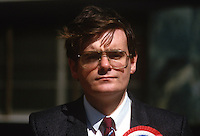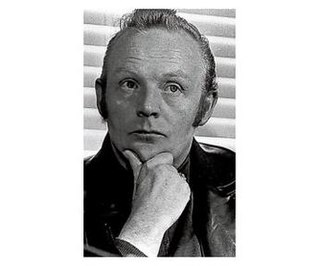
The Ulster Workers' Council (UWC) strike was a general strike that took place in Northern Ireland between 15 May and 28 May 1974, during "the Troubles". The strike was called by unionists who were against the Sunningdale Agreement, which had been signed in December 1973. Specifically, the strikers opposed the sharing of political power with Irish nationalists, and the proposed role for the Republic of Ireland's government in running Northern Ireland.

Albert Glenn Barr OBE was a politician from Derry, Northern Ireland, who was an advocate of Ulster nationalism. For a time during the 1970s he straddled both Unionism and Loyalism due to simultaneously holding important positions in the Vanguard Unionist Progressive Party and the Ulster Defence Association.

George Seawright was a Scottish-born unionist politician in Northern Ireland and loyalist paramilitary in the Ulster Volunteer Force. He was assassinated by the Irish People's Liberation Organisation in 1987.
The Ulster Loyalist Central Co-ordinating Committee (ULCCC) was set up in 1974 in Belfast, Northern Ireland in the aftermath of the Ulster Workers Council Strike, to facilitate meetings and policy coordination between the Ulster Workers Council, loyalist paramilitary groups, and the political representatives of Ulster loyalism.
The Ulster Workers' Council was a loyalist workers' organisation set up in Northern Ireland in 1974 as a more formalised successor to the Loyalist Association of Workers (LAW). It was formed by shipyard union leader Harry Murray and initially failed to gain much attention. However, with the full support of the Ulster Defence Association (UDA) the UWC became the main mobilising force for loyalist opposition to power-sharing arrangements.
Raymond "Ray" Smallwoods was a Northern Ireland politician and sometime leader of the Ulster Democratic Party. A leading member of John McMichael's South Belfast Brigade of the Ulster Defence Association (UDA), Smallwoods later served as a leading adviser to the UDA's Inner Council. He was killed by the Provisional Irish Republican Army (IRA) outside his Lisburn home.

John "Jackie" McDonald is a Northern Irish loyalist and the incumbent Ulster Defence Association (UDA) brigadier for South Belfast, having been promoted to the rank by former UDA commander Andy Tyrie in 1988, following John McMichael's killing by the Provisional IRA in December 1987. He is also a member of the organisation's Inner Council and the spokesman for the Ulster Political Research Group (UPRG), the UDA's political advisory body.
William Hull was a loyalist activist in Northern Ireland. Hull was a leading figure in political, paramilitary and trade union circles during the early years of the Troubles. He is most remembered for being the leader of the Loyalist Association of Workers, a loyalist trade union-styled movement that briefly enjoyed a mass membership before fading.

Tommy Herron was a Northern Irish loyalist and a leading member of the Ulster Defence Association (UDA) until his death in a fatal shooting. Herron controlled the UDA in East Belfast, one of its two earliest strongholds. From 1972, he was the organisation's vice-chairman and most prominent spokesperson, and was the first person to receive a salary from the UDA.
Andrew Tyrie is a Northern Irish loyalist paramilitary leader who served as commander of the Ulster Defence Association (UDA) during much of its early history. He took the place of Tommy Herron in 1973 when the latter was killed, and led the organisation until March 1988 when an attempt on his life forced him to resign from his command.

Frankie Curry was a Northern Irish loyalist who was involved with a number of paramilitary groups during his long career. A critic of the Northern Ireland peace process, Curry was killed during a loyalist feud.
Alex Kerr was a Northern Irish former loyalist paramilitary. Kerr was a brigadier in the Ulster Defence Association (UDA)'s South Belfast Brigade. He is no longer active in loyalism.

Billy Mitchell was a community activist and member of the Progressive Unionist Party. Mitchell was a leading member of the loyalist Ulster Volunteer Force (UVF) and served a life sentence for his part in a double murder. He later abandoned his UVF membership and took up cross-community work.

Kenneth Gibson was a Northern Irish politician who was the Chairman of the Volunteer Political Party (VPP), which he had helped to form in 1974. He also served as a spokesman and Chief of Staff of the loyalist paramilitary organisation, the Ulster Volunteer Force (UVF).
Clifford Peeples is a self-styled pastor in Northern Ireland who has been associated with Ulster loyalist activity. Peeples has been a member of the Ulster Volunteer Force (UVF), the Loyalist Volunteer Force (LVF) prisoners' spokesman and leader of the Orange Volunteers.
Leonard "Jim" James Anderson 27 May 1931 – 27 June 2019) was a loyalist paramilitary leader from Northern Ireland, who from April to December 1972, was the acting leader of the Ulster Defence Association (UDA) while its commander and the founder of the organisation, Charles Harding Smith was in jail on remand for gun-running. Upon the latter's return, Anderson, together with Harding Smith, was joint chairman of the UDA until he stood down in the spring of 1973. In the battle between Harding Smith and East Belfast brigadier, Tommy Herron for the succession to the leadership, a compromise candidate, Andy Tyrie, was appointed as chairman.

Reverend Robert James Magee OBE was a Northern Irish Presbyterian minister who is credited with playing a leading role in delivering the Combined Loyalist Military Command (CLMC) ceasefire of 1994. Earlier Rev Magee had been a leading figure in Unionism.
Samuel Smyth was a Northern Irish loyalist activist. A founder member of the Ulster Defence Association (UDA) he was the early public face of the movement as the organisation's spokesman, and he later became involved in the group's attempts to politicise. He was assassinated by the Provisional IRA as part of the Troubles. Author Steve Bruce described Smyth as the "sometime editor of the Ulster Militant and a loose cannon who enjoyed an exciting and erratic relationship with the UDA".
The Orange Volunteers (OV) was a loyalist vigilante group with a paramilitary structure active in Northern Ireland during the early 1970s. It took its name from the Orange Order, from which it drew the bulk of its membership.
The Ulster Volunteer Service Corps (UVSC) was an Ulster loyalist vigilante and paramilitary movement active in Northern Ireland during the early 1970s. Initially the steward group for the Ulster Vanguard, under the title Vanguard Service Corps, it continued to exist after becoming independent of that movement.









